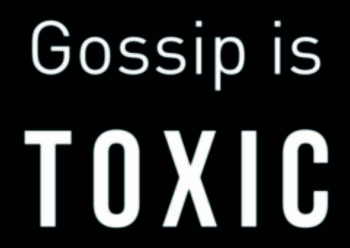Kicking the Gossip Habit
Recently, four employees of the town of Hooksett, New Hampshire, were fired for gossip. The four municipal workers, who had 46 years of combined service with the town, were discussing rumours of an improper relationship between the town administrator and another employee. The gossip scandal broke when the town administrator approached the city council asking for assistance, saying that the rumours caused him to suffer “physical symptoms of stress.” Councillors initiated an investigation which resulted in the firing of the four women, finding that “gossip, whispering and an unfriendly environment are causing poor morale and interfering with the efficient performance of town business.” At the hearing, the council lawyer said such workplace gossip was “insubordinate, dishonest and unsuitable.”
Though that incident is an unusual and drastic response to gossip, it does demonstrate the damage gossip can cause. The town administrator was deeply hurt by the spreading rumours and the four women were damaged professionally for their part in it. Though gossip can be found in families, the workplace, schools, churches and clubs, it ought to be viewed as a high-risk activity because it has the potential to be harmful even when the gossip may be true. “Gossip needn't be false to be evil -- there's a lot of truth that shouldn't be passed around,” observed Frank A. Clark.
That may be why the Bible issues this prohibition against gossip: “Do not go about spreading slander a mong your people” (Leviticus 19:16, NIV). Though most people engage in gossip, it is an unwise habit. Here are ways to kick the gossip habit.
mong your people” (Leviticus 19:16, NIV). Though most people engage in gossip, it is an unwise habit. Here are ways to kick the gossip habit.
Use Socrates' triple filter test
The Greek philosopher was once stopped by a colleague who began a conversation saying: “Do you know what I just heard about your friend?” Socrates interrupted the man to say: “At the risk of appearing rude, may I ask you to pass a small test. I call it the triple filter test.” Curious, the colleague listened as Socrates explained the triple filter. “The first filter is truth. Have you made absolutely sure that what you are about to tell me is true?” When the man said “no, I just heard about it,” Socrates said: “All right. So you don't really know if it's true or not. Let’s try the second filter, which is goodness. Is what you are about to tell me about my friend something good?”  Again, the man said “no, quite the opposite.” Socrates continued: “So, you want to tell me something bad about him but you're not certain if it is true. You can still pass this test though because of the final filter and it is the filter of usefulness. Is what you want to tell me about my friend going to be useful to me?” Once again, the man, probably embarrassed, said, “no, not really.” Socrates concluded with this point: “Well, if what you want to tell me is neither true nor good nor even useful, why tell it to me at all?”
Again, the man said “no, quite the opposite.” Socrates continued: “So, you want to tell me something bad about him but you're not certain if it is true. You can still pass this test though because of the final filter and it is the filter of usefulness. Is what you want to tell me about my friend going to be useful to me?” Once again, the man, probably embarrassed, said, “no, not really.” Socrates concluded with this point: “Well, if what you want to tell me is neither true nor good nor even useful, why tell it to me at all?”
Understand the consequences of gossip
We can never hear this warning enough: gossip seems harmless yet it can be dangerous, disastrous and destructive to relationships. The apostle Paul may have had that in mind when he advised: “Do not let any unwholesome talk come out of your mouths, but only what is helpful for building others up” (Ephesians 4:29).
Consider these potential consequences the next time you are tempted to talk about someone:
• Relationships are harmed, sometimes irreversibly
Think about yourself: how would you feel about a good friend when you learn he has shared confidential information about you?
• Trust is eroded, even destroyed
A woman, concerned about a work colleague, spoke about her concern with a friend of both of them. That friend contacted the work colleague offering to help with the issue. That colleague was furious with the woman in spite of the fact her intentions may have been pure.
• Your credibility can be impacted
Do you want to be known as a gossip? If others perceive you as untrustworthy and unable to keep a confidence they will stay away from or keep all conversation on a very superficial level. Your relationships will lack depth and authenticity.
• You may suffer emotionally
Ask yourself how you feel after you've engaged in gossip. It can leave you feeling guilty, uneasy, anxious, regretful. Those are all negative emotions which can create stress and even physical problems.
 Hold back because it can't be undone
Hold back because it can't be undone
“The prudent person keeps quiet,” is wisdom from the prophet Amos (5:13). Before you talk about someone, try reminding yourself that once it's unleashed it can't be reined in. No matter how much you regret what you said, gossip is often irrevocable. That's the lesson of this Hasidic story of a man who spoke to many people in the small village gossiping about their rabbi. One day, his conscience disturbed him greatly for the unfair, unjust comments he made, so he approached the rabbi asking to be forgiven. The rabbi said he would forgive him on one condition: that he go home, cut up a feather pillow and scatter the feathers into the wind. The man did so and returned to the rabbi asking: “Am I forgiven now?” The rabbi said: “There is one more thing. Now I want you to go and gather all the feathers.” The man objected saying “that's impossible!” to which the rabbi drove home this lesson about gossip: “Precisely. And although you sincerely regret the damage you have done to me, it is as impossible to undo it as it is to recover all the feathers.”
Don't participate
The Bible notes: “Without wood a fire goes out; without gossip a quarrel dies down” (Proverbs 26:20). When you hear gossip, you have several positive options:
• don't say anything;
• walk away;
• give visual cues that you're uncomfortable or uninterested;
• and definitely don't pass along what you heard.
A nurse on duty at her hospital was shocked by a gossip incident. “On my way to lunch, I got into an elevator filled with nurses, residents, and physicians. As we went down, a veteran nurse specialist who should know better proceeded to tell her companions – and all of us in earshot – about a former employee who's currently a patient at the hospital. She identified the patient by name, diagnosis, and the department where she used to work. I glanced at one of the physicians, who rolled his eyes in disbelief.” Stepping out of the elevator, the physician said to the nurse, under his breath: “How could such an excellent nurse blurt out confidential patient information in a public elevator.” That's a model example of not participating in gossip.
 Rise above the temptation
Rise above the temptation
You don't have to succumb to gossip. If you see or hear something, just keep it to yourself. Often gossip lacks more complete information and errors in judgment take place. A woman recently wrote to an advice columnist saying she was a forty-five-year-old single woman whose best friend was a man. “Gavin and I have known each other since I was 3. We were raised together and consider ourselves like brother and sister. We have always had a strictly platonic friendship. Gavin is married to a wonderful woman who is also a friend of mine.” The woman explained that Gavin and his wife rode motorcycles together but a recent physical disability made it impossible for her to ride. Gavin's employer held a charity motorcycle ride so Gavin's wife asked the woman to ride with her husband, Gavin, to keep him company. “I did and had a wonderful time. Since then, I have learned that several people have been spreading rumours that Gavin and I are having an affair because I was seen on the motorcycle with him. His wife says not to worry about it but my feelings are hurt and I feel my reputation is being tarnished.” The people who gossiped did not have all the facts. Pain and hurt could have been avoided if they had risen above the temptation of jumping to conclusions and gossiping.
If you talk about others, keep the circle small
There are times when we hear something very upsetting and want to unburden by sharing it. This ought to be done only with the closest of confidants, such as a partner or a very good friend. In his book, A Code of Jewish Ethics, Joseph Telushkin says: “If you are going to gossip anyway, limit the number of people with whom you gossip. Thus, if we hear something unusual, and perhaps negative, about a mutual friend, we will probably relate it to our spouse or partner, and perhaps one or two close friends. But we should make sure to stop there. Obviously, even this situation is not ideal, since our friends will probably share the news with their close friends.”
Telushkin offers this additional advice: “If you are going to gossip (with a small number of people), develop a way of talking about others that is as kind and fair as you would want others to be when saying things about you that, although true, are not complimentary.”
Perhaps this statement from American humorist Will Rogers succinctly summarises how to deal with gossip. “Live in such a way that you would not be ashamed to sell your parrot to the town gossip.”
 Ritual for Cleansing after Hearing Gossip
Ritual for Cleansing after Hearing Gossip
Chaplain David J. Zucker, PhD of Aurora, Colorado offers this ritual:
1. Find a quiet place to centre yourself.
2. Go to the nearest bathroom and wash your hands, rinse out your mouth and use some water to symbolically rinse out your ears.
3. Recite these or similar words: “Lord who knows my inner spirit, purify me from what I have experienced. I have 'washed my hands' of that event; I have 'cleansed my tongue' in recognition of words that I could not speak by way of protest; and I have 'rinsed my ears' for having heard such talk.
4. Finally, follow up this ritual and prayer with a specific act of kindness to someone in order to restore some goodness and godliness to this world.

 Entries(RSS)
Entries(RSS)